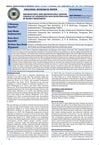 11 citations,
September 2022 in “The Journal of Rheumatology”
11 citations,
September 2022 in “The Journal of Rheumatology” Skin problems are common in lupus patients and should be treated early to prevent worsening.
[object Object] 9 citations,
June 2023 in “Cells” Certain natural and synthetic compounds may help treat inflammatory skin diseases by targeting a specific signaling pathway.
6 citations,
November 2018 in “Case reports in nephrology and dialysis” Rituximab may be an effective treatment for Cronkhite-Canada syndrome with kidney disease.
5 citations,
February 2022 in “Animals” Sodium sulfide slows wound healing, while electric shaving is the safest for preoperative hair removal.
 3 citations,
June 2023 in “Medicines”
3 citations,
June 2023 in “Medicines” Some antiseizure medications can cause reversible hair loss, with valproate, lamotrigine, and carbamazepine being the most common.
1 citations,
December 2021 in “Animals” Low zinc and selenium levels in sheep are linked to hair loss and thyroid problems.
 5 citations,
May 2023 in “Frontiers in immunology”
5 citations,
May 2023 in “Frontiers in immunology” Environmental factors like diet and vitamin levels, especially Vitamin D, can affect autoimmune diseases differently, with lifestyle changes potentially improving outcomes.
 November 2021 in “PARIPEX INDIAN JOURNAL OF RESEARCH”
November 2021 in “PARIPEX INDIAN JOURNAL OF RESEARCH” Trigona honey effectively treats dermatitis in dogs.
April 2018 in “Veterinary Pathology” Tigers had a skin condition causing hair loss and inflammation, but the cause is unknown and treatment didn't work.
 34 citations,
February 2016 in “Fertility and Sterility”
34 citations,
February 2016 in “Fertility and Sterility” More PDCD4 is linked to obesity, insulin problems, and cell death in ovaries for those with polycystic ovary syndrome.
 25 citations,
February 2012 in “The Journal of Allergy and Clinical Immunology”
25 citations,
February 2012 in “The Journal of Allergy and Clinical Immunology” Finasteride caused a rare skin rash in a man, which improved after stopping the medication.
 19 citations,
March 1997 in “Journal of Cutaneous Pathology”
19 citations,
March 1997 in “Journal of Cutaneous Pathology” Alopecia areata involves specific T-cells, unlike androgenetic alopecia.
 18 citations,
September 1990 in “Veterinary Dermatology”
18 citations,
September 1990 in “Veterinary Dermatology” Lambs' skin showed similar but more severe responses to a second orf virus infection, involving immune cells and new skin formation.
 8 citations,
January 2022 in “Burns and trauma”
8 citations,
January 2022 in “Burns and trauma” Skin cell-derived vesicles can help heal skin injuries effectively.
 6 citations,
July 2015 in “European Journal of Dermatology”
6 citations,
July 2015 in “European Journal of Dermatology” Stopping methotrexate might reverse lymphoma-like conditions in some patients.

Stem cell therapy shows promise for treating hair loss in androgenetic alopecia.
 320 citations,
December 2018 in “Frontiers in Immunology”
320 citations,
December 2018 in “Frontiers in Immunology” Changing how mesenchymal stromal cells are grown can improve their healing abilities.
 130 citations,
September 2018 in “Cell Reports”
130 citations,
September 2018 in “Cell Reports” Macrophages help heal nerves by aiding the maturation of Schwann cells and are important for nerve repair.
 88 citations,
January 2019 in “Journal of Tissue Engineering and Regenerative Medicine”
88 citations,
January 2019 in “Journal of Tissue Engineering and Regenerative Medicine” Conditioned media from mesenchymal stem cell cultures could be a more effective alternative for regenerative therapies, but more research is needed.
 271 citations,
May 2019 in “Cells”
271 citations,
May 2019 in “Cells” The secretome from mesenchymal stem cells is a promising treatment that may repair tissue and avoid side effects of stem cell transplantation.
 1 citations,
October 2020 in “Journal of Cosmetic Dermatology”
1 citations,
October 2020 in “Journal of Cosmetic Dermatology” Possible link between hair loss and metabolic syndrome, with RANTES as a potential clue.
 47 citations,
March 2019 in “Journal of immunology research”
47 citations,
March 2019 in “Journal of immunology research” Valproic Acid could potentially be used to treat immune-related conditions due to its ability to modify immune cell functions.
 2 citations,
October 2015 in “Human Gene Therapy”
2 citations,
October 2015 in “Human Gene Therapy” The congress highlighted new gene therapy techniques and cell transplantation methods for treating diseases.
 159 citations,
December 2007 in “American Journal of Pathology”
159 citations,
December 2007 in “American Journal of Pathology” Stress-related substance P may lead to hair loss and negatively affect hair growth.
46 citations,
October 2018 in “JCI insight” CD8+ T cells are involved in alopecia areata and may cause disease relapse.
 August 2023 in “Research Square (Research Square)”
August 2023 in “Research Square (Research Square)” Melanocytes may trigger the immune response in alopecia areata, affecting hair regrowth.
245 citations,
October 2015 in “Nature medicine” Hair follicle-derived IL-7 and IL-15 are crucial for maintaining skin-resident memory T cells and could be targeted for treating skin diseases and lymphoma.
[object Object]  98 citations,
December 2008 in “Journal of Investigative Dermatology”
98 citations,
December 2008 in “Journal of Investigative Dermatology” Prolactin affects hair growth and skin conditions, and could be a target for new skin disease treatments.
 97 citations,
May 2008 in “Journal of Cutaneous Pathology”
97 citations,
May 2008 in “Journal of Cutaneous Pathology” Different soft tissue fillers can cause various skin reactions; biodegradable fillers are safer and non-biodegradable ones like silicone can lead to long-term problems.
 65 citations,
February 2017 in “Pflügers Archiv - European Journal of Physiology”
65 citations,
February 2017 in “Pflügers Archiv - European Journal of Physiology” Macrophages are vital for skin healing, hair growth, salt balance, and cancer defense.























